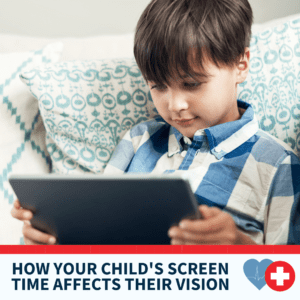How a Child’s Screen Time Affects Their Development
 Gone are the days of families gathering around the television set to watch the evening news or the latest episode of a primetime sitcom. Nowadays, people across America have 24/7 access to a seemingly endless library of media content that can be viewed on a variety of devices. Whether it’s on a smartphone, laptop, tablet or TV, parents and kids alike are consuming video and online gaming content at a higher rate than ever before. According to a hours per day watching and interacting with digital screens. With virtual learning methods becoming increasingly used in schools, children are spending more and more time interacting with screens on a daily basis.
Gone are the days of families gathering around the television set to watch the evening news or the latest episode of a primetime sitcom. Nowadays, people across America have 24/7 access to a seemingly endless library of media content that can be viewed on a variety of devices. Whether it’s on a smartphone, laptop, tablet or TV, parents and kids alike are consuming video and online gaming content at a higher rate than ever before. According to a hours per day watching and interacting with digital screens. With virtual learning methods becoming increasingly used in schools, children are spending more and more time interacting with screens on a daily basis.
While screen time is an inevitable part of everyday life both in school and at home, monitoring the amount of time your child is using screens is important for their overall development. For parents looking to understand the effects of screen time on a child’s growth, read on to find out how healthy screen time habits can help your child’s overall mental and physical development.
Learning and language development
For kids between 1 1/2 and 3 years of age, this period is defined by significant language development that’s essential to a child’s academic and mental development. Studies have shown that kids learn language most effectively through healthy interaction with adults who are playing and communicating with them in the real world, as opposed to from watching interactions on a screen. In fact, it’s not until after age 2 that kids even begin to comprehend what is going on in the content they are viewing. So while educational shows like “Sesame Street” are good entertainment, they are not proper substitutes for the learning that young children gain through real-world interactions.
Vision impairments
Excessive screen time can lead to eye fatigue, headaches and even long-term complications such as myopia (nearsightedness). According to a research study published in The Lancet Digital Health medical journal in 2021, excessive screen time on handheld devices is associated with a 30% higher risk of developing myopia. When combined with lots of time on the computer, the risk of developing nearsightedness increases to about 80%. By limiting your child’s screen time, you might help prevent lifelong vision impairment.
Physical development
Excessive screen time can affect your child’s physical growth and development. Kids who exceed the recommended amount of healthy screen time are likely to have trouble sleeping as a result of blue light emitted from screens inhibiting the circadian sleep rhythm and natural production of the sleep hormone melatonin. This negative impact on a child’s sleep cycle can directly affect their physical development and even lead to weight gain and long-term sleep issues.
Screen time is time your child is not spending getting out and being active, which can contribute to becoming overweight or even obese. Being overweight or obese can lead to low self-esteem, which can then result in self-isolation and even more screen time. By limiting and monitoring a child’s time interacting with screens, you can ensure they are leading a more active lifestyle while maintaining a healthy sleep schedule that will contribute to healthy physical development.
Healthy screen time tips
According to the American Association of Pediatrics, the recommended screen time by age group is as follows.
- 18 months old and younger: Avoid screen use other than video-chatting.
- 18-24 months old: Limit your child to a maximum of 30 minutes of screen time per day.
- 2-5 years old: Limit your child to a maximum of 1 hour of screen time per day.
- 6-12 years old: Limit your child to a maximum of 1 to 1 1/2 hours of screen time per day.
- 12 years and older: Limit your child to a maximum of 2 hours of screen time per day.
In addition to monitoring the amount of time your child is using a screen, it’s highly recommended to keep mealtime and bedtime screen-free, as well as monitor your own personal screen usage to set a healthy example for your kids. Parents are also encouraged to be wise when selecting the type of media your child is consuming, with an emphasis on allowing kids to view content that is informative and high-quality. Try to co-watch with your kids as much as possible, as it gives you a chance to comment and educate your kids on what they are watching while allowing them to ask questions and engage with what they’re viewing in a healthy way.




